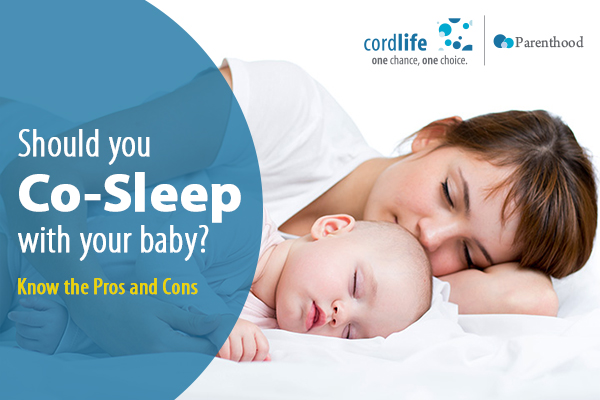Table of Contents
- Co-sleeping Pros
- Baby’s Comfort-sleeping
- What To Do?
- Mums Sleep Better
- What to Do?
- Aids Baby’s Growth
- What to Do?
- Deepens Bonding
- What to Do?
- Let’s Look At the Co-sleeping Cons
- Hampers Married Life
- What to Do?
- Parents’ Sleep Quality May Suffer
- What to Do?
- Hair and Threads From Sheets Are Problems
- What to Do?
- Unsafe
- What to Do?
- To Co-sleep or Not? Is That The Question?
The practice of co-sleeping may be controversial in several parts of the world, but co-sleeping existed as a common norm in several cultures prior to the late 1700s. Some Indian parents still don’t purchase a crib or cradle after they have their baby. They, rather prefer to have their baby curled up next to them from day one.
With several arguments for and against co-sleeping, do you think you should co-sleep with your baby?
Know the pros and cons and take the best decision:
Co-sleeping Pros
Baby’s Comfort-sleeping
Sleep anxieties in babies are normal. Sleeping with your baby means comfort-sleeping for the baby. This proximity will make them feel safe and reduce their anxiety level, thereby improving their sleep pattern.
What To Do?
Place his or her crib next to your bed, or share your bed with the baby.
Mums Sleep Better
Giving birth is a life-changing event in a woman’s life. However, overwhelmed by fatigue during pregnancy along with the medical necessities after-delivery, a new mum is practically unable to move out of the bed. And waking up several times at night to breastfeed the baby seems just next-to-impossible for her.
Keeping the baby in close quarters will help her to feed the baby frequently while getting less exhausted. Moreover, breastfeeding while co-sleeping releases oxytocin hormones, which might help her recover from postpartum depression.
What to Do?
Breastfeeding while lying down can help to rest your body and feed your baby at the same time. You get some addition tips on breastfeeding.
Aids Baby’s Growth
Due to the presence of prolactin and melatonin (growth hormone) in the mother’s milk, the milk supply during the night is usually longer. And it helps in baby’s growth (physically and mentally), even while he or she is sleeping.
What to Do?
To avoid causing any harm, make sure you put your baby on his back and never on his stomach after breastfeeding.
Deepens Bonding
When babies are against their mother’s skin, while co-sleeping, it is the closest they can get to being back in the warmth and security of the womb. And experts are of the opinion that, this skin-to-skin contact with your baby is important to help you strengthen your bond with your baby and promote brain development in him or her.
What to Do?
Co-sleep or Not. But, don’t forget to cuddle your baby very often.
But what is the right age to initiate solitary sleeping?
According to Dr. Debmita Dutta, who is parenting consultant and founder of What Parents Ask, “If children are not put on a separate bed at the right age, doing so becomes difficult as they grow older. By the time the child is seven to eight months old, he or she should be shifted to a crib in the same room since you would still have to wake up in the middle of the night to change diapers. But the child needs to have a separate bed. Post that age, the child tends to protest, and suffers separation anxiety, and might have night fears if made to sleep alone.”
Why is solitary sleeping needed?
Let’s Look At the Co-sleeping Cons
Hampers Married Life
During the initial phase of parenthood, the relationship between the husband and wife takes a beating and having the little one sleep in between them simply adds to it.
What to Do?
It is extremely important not to lose your marital bliss. Remember happy family = happy baby.
Parents’ Sleep Quality May Suffer
Many parents while co-sleeping with their baby, feel exhausted managing the restlessness of the baby, while sleeping. The active sleepers may disrupt their parent’s sleep by kicking or thrashing around.
What to Do?
So, ideally a mother can sleep on a double bed with a railing on the baby’s side. This is helpful in case you have to feed the baby at night frequently.
Hair and Threads From Sheets Are Problems
“Toe Tourniquet” is one of the scariest things that can happen to babies. The strand of hair or threads from sheets can get wrapped around the finger or toe. It may eventually cut off the blood supply.
What to Do?
Tie up your long hair and stay away from duvets and covers with exposed threads.
Unsafe
Instances of the Sudden Infant Death Syndrome (SIDS) or a baby hurting himself because of falling down from the side of the bed has made co-sleeping unsafe.
What to Do?
Since recent studies have shown that smoking, drinking alcohol and falling asleep with the baby has increased the risks of SIDS, so say a big “No” to Alcoholism or any form of substance abuse while caring for your baby.
To Co-sleep or Not? Is That The Question?
Now that you are aware of all aspects of co-sleeping and solitary sleeping, go ahead and choose what works best for you and your family. In fact, having a discussion with your paediatrician is highly recommended.
